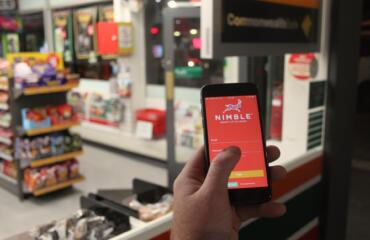On the first Sunday of October, five people and a red lobster plushie are sitting at the back of a bustling Irish pub in Melbourne.
Having matched online, they’re here to discuss the teachings of Jordan Peterson, the controversial Canadian psychology professor who has argued, among other things, that “feminists avoid criticizing Islam because they unconsciously long for masculine dominance”.
The scene resembles a bible studies class. Someone reads out Petersons’ 12 Rules of Life from a Wikipedia page on their phone, before members discuss. They read Rule 8: ‘Tell the truth — or, at least, don’t lie”.
“What do we think this means?” asks Henry (not his real name), an aging Indian man.
“I think it means, to not lie,” another responds.
“Hmm, interesting,” Henry mumbles, as the group ponders thoughtfully.
Max (not his real name), a balding man in his 30s, is listening in. He’s one of the organisers. Wearing a light blue polo shirt and khakis, he man-spreads across his chair to discuss the “gender wage gap myth” in his slight Kiwi accent.
Max, who views Peterson as a “role model”, was devastated when he missed out on seeing Peterson speak in Melbourne. Instead he saw Nigel Farage, a British politician for the far-right Ukip party and a leader of the Brexit campaign.
“The radical leftists were there, so I wanted to see him,” Max said.

Nigel Farage and former PM Tony Abbott in Sydney. Picture: John Feder/The Australian.
Farage is the latest in a slew of international far-right speakers coming to Australian shores in the last twelve months. Starting with former Breitbart columnist Milo Yiannopoulos in December last year, followed by Jordan Peterson, Lauren Southern and Stefan Molyneux, alt-right figures have flown down to speak to dedicated (and paying) audiences.
In their events, they rage against immigration, gender politics and political correctness and, inevitably, cause riots.
Yet the businesses that organise and execute these events have avoided the scrutiny their imports have received. There are currently three event organisations that bring alt-right personalities to Australia: Penthouse Events, Axiomatic Events and True Arrow Events.
The most prolific is Penthouse Events, an offshoot of struggling sex magazine Penthouse, and the brainchild of publisher Damien Costas. Looking for new revenue, Penthouse brought Milo Yiannopoulos — far-right speaker known for harassing women online and an apologist for paedophilia — to Australia at the end of last year. Penthouse has since organised Nigel Farage, and is currently planning to headline Gavin McInnes, the founder of men’s rights group Proud Boys.
Axiomatic, founded by conservative commentator Dave Pellowe, is responsible for bringing YouTube far-right celebrities Stefan Molyneux and Lauren Southern in July this year; Southern illegally tried to disrupt refugee boats crossing the Mediterranean in 2016, putting lives at risk.
Founded by Melbourne-based musician Samuel McClelland, True Arrow Events claims to be an events business focused on mental health and “rescuing our culture from chaos”. It’s first speaker was Jordan Peterson in March this year.
The equation for these businesses goes like this: bring a provocative speaker with a large international following; speaker says or does something controversial — Southern landed at Cairns airport with a t-shirt that read “It’s okay to be white” — leading to media coverage; media coverage enrages and inspires Australians, translating into ticket sales for the likes of Axiomatic and Penthouse.
And it seems to have worked, as most of their events were reportedly sold out. SBS reported Yiannopoulos sold 10,000 tickets across his five-city tour. And as musicians discovered years ago, live events with your most intense fans are far more lucrative than relying on advertising revenue from platforms like YouTube.
These intense fans are, by-in-large, disaffected people, struggling to find meaning in an increasingly alien modern world. Businesses have been quick to profit from this sentiment, with services like self-help seminars and mindfulness retreats claiming to address these feelings.
But instead of meditating to New Age soundtracks of pan flutes, these far-right events promote the benefits of racism, political isolation, and meninism for mental health and chaotic politics.
Josh Tilley, at 25, found his life adrift. “I used to do coke, MDMA too much,” Tilley admits. “I finally got a girlfriend who I really didn’t want a long-term thing with.” That was before he discovered Peterson online, through podcasts and videos on YouTube. Tilley was hooked. “Everything he said is common sense.”
In March this year, Tilley bought a $90 ticket for Peterson’s event in Melbourne, as did a thousand others. This was the first time he’d bought tickets to a speaking event, preferring it to a “sweaty music festival just to see a few acts you only half want to see”.
“The live event was great. The venue was indicative of Peterson’s character — classy.”

Entry level tickets for these events range from $79 to $90, but can skyrocket to $350 or even $750 for ‘meet and greet’ tickets. A private dinner with Milo would have set you back $1000.
While none of the firms are forthcoming about ticket sales, multiplying the number of tickets by the average ticket price excluding ‘meet and greets’, gives a conservative $2.9 million in ticket sales for alt-right speaking events in Australia over the last 12 months. This doesn’t consider sales of merchandise sold in the venues.
This, however, is minuscule compared to the $1.88 billion in revenue for all live events across Australia in 2017, according to research group Live Performance Australia.
The tiny market may be due to underestimating the demand for these events in Australia. Most of the venues organised were small — the largest housing less than 1,200 — and sold out quickly. Peterson’s 1,000 seat Melbourne event sold out in a matter of days. In response, the firms have brought more speakers as the year went on, scrambling to meet demand.
But why Australia?
Robert Hassan, Associate Professor of Culture and Communications at the University of Melbourne, says this is a movement of businesses and speakers exploiting resentments about globalisation, immigration, identity politics, and low wages around the world, including Australia. “They all press the same buttons that Trump does, and the promoters of Brexit do,” Hassan said.
According to the Australian Bureau of Statistics, private sector wage growth in Australia has stagnated since March 2013, worsened by dramatic increases in the cost of fuel and healthcare.

Real wage growth for public and private sector workers in Australia from 2005 to 2015. Chart by Bill Mitchell. Open image in a new tab for more.
“These speakers have a schtick that is part racism and part entertainment,” Hassan said. “They are essentially looking to drive up the click-bait so they can charge appearance fees, secure book contracts, and whatever else they can make money from.”
The strategy of controversy seems to have paid off. Many of these speakers were offered large upfronts, with the Sydney Morning Herald reporting Milo was promised $250,000 for his Australian speaking engagement by Penthouse.
Despite the business success, these events have inflamed and divided Australians.
Anneke Demanuele is a founding member of Campaign Against Racism and Fascism, a group protesting far-right speakers and campaigns in Victoria.
Demanuele sounds weary when talking about the far-right. “There is a ready-made audience in Australia… The alt-right is gaining ground.”
In response, her group has organised protests outside these far-right events. “We’re against oppression and injustice. We want to show they won’t have an easy run.”
Demanuele notes their engagement with the local community. During the Milo event in Flemington in Melbourne’s inner north, members of the commission flats nearby — including Sudanese migrants — joined in with four hundred other protesters. “It was great to see them fight back.”
These protests have had an economic impact on the organisers. Axiomatic was charged with, and refused to pay for, a $68,000 security bill by the Victorian police for the additional police needed to handle protestors during the Lauren Southern and Stefan Molyneux event. Milo was similarly charged $50,000.
A spokesperson for Axiomatic said the the protestors negatively affected their businesses, as some potential attendees “stayed away for fear of violent leftist thugs,” explaining the outfit had expected slightly more attendees.
There has also been economic harm to the venues that hosted the alt-right. Amanda Blythman, venue manager for the Melbourne Pavilion, hosted Milo last year and, unintentionally, hundreds of protesters. “We underestimated the pure protest power of the left and right factions,” Blythman said.
“Post-event we received over 150 emails, our Facebook was taken down. We even lost business” because they hosted Milo, Blythman explained.
Blythman ruled out any future events of this type. “We would never consider it. Not again.”
Some organisations have followed this advice. Southern and Molyneux cancelled their Auckland event after the venue, The Powerhouse, pulled out hours before they were set to appear, forcing Axiomatic to issue refunds.
Despite protests, these businesses continue to bring speakers. Penthouse is bringing Gavin McInnes in November; Milo is returning later this year with American right-wing commentator Ann Coulter. And Peterson announced he’s looking to return to Australia sometime in February. Axiomatic is also looking at bringing more speakers over, with a spokesperson saying that they’re considering “speakers that satisfy” Australian audiences.
Max for his part has bought tickets for Milo’s return. He says he wants to send a message to the “liberal thugs”.
“I want to push back against left-wing activists who oppose freedom of speech,” Max said.
And despite the high price, these events may have helped some. Tilley says seeing Peterson live made his life more focused. As an example, Tilley says Peterson’s support for monogamy made him push through in his relationship with his girlfriend. “Now I am now in love and couldn’t imagine a life without her.”
“Obviously I’m still attracted to other women and still use drugs very occasionally.”




